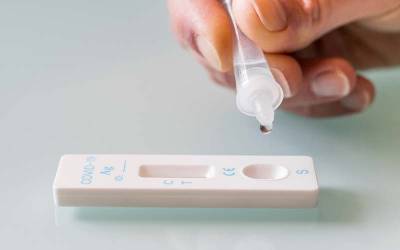Cardiovascular
Covid Infection Risk Nearly Doubled by Cardiovascular Disease
The risk of COVID-19 infection is around two times higher in older adults with cardiovascular disease and complex comorbidities than in their healthier peers, according to a new study from UCL.
The study, published in Gerontology, analysed data from 4,428 individuals over the age of 50 who took part in the English Longitudinal Study of Ageing (ELSA) COVID-19 Sub Study in 2020.
Researchers then placed participants into four groups based on their long-term conditions.
Participants were grouped into those with metabolic disorders (hypertension, hyperlipidemia and diabetes), those with heterogeneous comorbidities (eye disease, arthritis, cancer, lung disease, osteoporosis, and psychiatric conditions), those who had cardiovascular disease alongside other complex comorbidities (hypertension, arthritis, eye disease, and hyperlipidemia), and the “healthiest” group, who mostly only suffered from arthritis.
The team found that people with both cardiovascular disease and complex comorbidities had an 87% increase in the risk of being infected with COVID-19, according to results of PCR or rapid testing, or whether they had reported experiencing symptoms during the early pandemic.
Meanwhile, those with heterogeneous comorbidities had a 56% increase in the risk of COVID-19 infection.
Several other pre-existing long-term conditions identified pre-pandemic, including lung diseases, arthritis and psychiatric disorders, were also found to be related to the risk of subsequent COVID-19 infection. The study also revealed that older adults with retinopathy/eye diseases were at a high risk of COVID-19 related hospital admissions.
Lead author of the study, Dr Yun-Ting (Joyce) Huang (UCL Epidemiology & Public Health and University of Manchester) said: “Older people often live with more than one long-term condition and some have complex comorbidities. The complexity of their underlying health conditions would affect the probability of being infected with COVID-19 and the subsequent risk of being hospitalised.
“Although the link between cardiovascular disease and COVID-19 infection is still unclear, some potential direct COVID-19 and indirect immune responses impacting the cardiovascular system have been explored.”
Researchers believe that this group of people are more vulnerable and are more likely to be symptomatic, so they may be proactive in testing themselves or require treatments that need prior testing. The findings may be a combined effect of increased likelihoods of being infected, of being symptomatic and of testing more regularly.
Dr Huang said: “Our findings highlight the vulnerability of those with cardiovascular disease and complex comorbidities, who need a tailored prevention and treatment strategy in the evolving COVID-19 pandemic.”
The study also found that those with undiagnosed diabetes prior to the pandemic had almost fivefold higher risk of being hospitalised with COVID-19. Respondents who reported that they did not have a diabetes diagnosis but whose blood tests indicated elevated blood sugar levels were defined as having “undiagnosed diabetes”.
Co-author, Professor Esme Fuller Thomson (Director of the Institute of Life Course and Aging, University of Toronto), said: “The substantially elevated risk of COVID-19 related hospitalisation among those with undiagnosed diabetes underlines the importance of improving diabetes screening and management among older adults.”
Dr Dorina Cadar, (UCL Behavioural Science and Health and Brighton and Sussex Medical School), said: “This study provides new evidence using a novel data-driven approach to cluster comorbidities in relation to COVID-19 related outcomes. Our findings reinforce the need for tailored public health policies that evolve with the COVID-19 pandemic to improve prevention and timely treatment strategies, such as early administration of antiviral medications, for vulnerable ageing populations.”
The work was supported by a collaborative project between UCL and the University of Toronto, the National Institute on Aging (R01AG017644) and a consortium of UK government departments coordinated by the National Institute for Health Research (198/1074-02). Data collection during the COVID-19 pandemic was funded in part by the UK Economic and Social Research Council (ES/V003941/1).
Study limitations
Most of the data was self-reported, so the study may be subject to recall bias.

